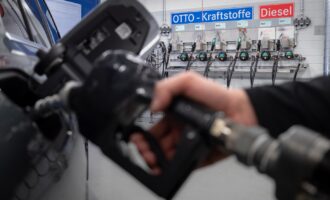EcoLabel upgrade may actually set back growth of Environmentally Acceptable Lubricants
By Aaron Stone
A taskforce reviewing EU Ecolabel regulations has proposed changes to the European labelling scheme, including increasing renewability content and percent requirements around biodegradability. Describing the proposed changes, during an expert panel discussion at F+L Week 2017, Bernard C. Roell, Jr., vice president of Research and Development at RSC Bio Solutions, suggested “a lot of the changes may actually set back growth of Environmentally Acceptable Lubricants (EALs)”.
Consumers today are increasingly sensitive to the protection of the environment. The European commission claims 80% of European consumers would avail of the opportunity to purchase more environmentally friendly products, so long as they are appropriately certified by an independent organisation.
Despite this claim, the adoption of environmentally acceptable lubricants has been somewhat limited to date. Roell says, until recently, spills and exposure have gone unnoticed, companies have been forced to make significant trade-offs between environmental benefits and lubricant performance, and base oil and additive options were expensive, and limited. This has restricted use of EALs to relatively niche applications.
EALs are categorised as lubricants achieving specific criteria of biodegradability, minimising toxicity and bioaccumulation. The U.S. Environmental Protection Agency’s (EPA) definition of environmentally acceptable lubricants includes no specification on the origin of base oil, allowing some synthetics lubricants, formulated with non-renewable mineral based oils, to maintain a classification as an EAL. There is ambiguity over whether bio lubricants should simply minimise environmental impact or be based on renewable sources.
We are beginning to observe a significant upswing in the use of biolubricants and EALs. A report from Grand View Research predicts the global bio lubricants market to reach USD2.92 billion by 2024, off the back of a compounded annual growth rate of 6.9%. Market demand is forecast to reach 1,115 kilo tonnes; it was estimated at 630 kilo tonnes in 2015.
Roell reveals, “many of the major oil companies have adopted EALs to fill a niche they don’t currently have,” this has helped accelerate the pace of growth. Currently, most major oil companies rebrand environmentally acceptable lubricants from RSC Bio Solutions or an EAL competitor. He suggests that “some major oil companies are looking to develop their own technology.”
A substantial increase in global regulations has occurred since 2007, driven by growth in emerging economies, changing resource scarcity patterns, public opinion and pressures to become more sustainable, and the growing impact of climate change.
Thousands of new environmental protocols are awaiting attention from legislators across all regions, led by Europe, North and Latin America. European Ecolabel and the U.S. EPA’s Vessel General Permit (VGP) are two major regulations that have been successful in accelerating the growth of EALs.
Ecolabel is a voluntary European labelling scheme, implemented to encourage companies to develop product and services that are friendlier to the environment. Products that successfully achieve Ecolabel certification are easily identifiable, and guaranteed by the official EU mark for greener products. Certification boasts several environmental and performance benefits including: reduced impact on soil and aquatics, lower emissions, a high proportion of renewable raw materials and superior technical performance.
As of March 2016, 36,395 products were awarded the EU Ecolabel. France, Italy and Germany are leading the way with the most Ecolabel licenses.
 Roell, an organic chemist with more than 25 years R&D experience in a wide range of industrial lubricant applications, recently attended the Ecolabel Taskforce meeting in Europe. The objective of the taskforce is to revise the existing Ecolabel criteria for lubricant products to make the regulation tighter and more stringent, but Roell says this must be balanced with performance, price and adaptation of technology.
Roell, an organic chemist with more than 25 years R&D experience in a wide range of industrial lubricant applications, recently attended the Ecolabel Taskforce meeting in Europe. The objective of the taskforce is to revise the existing Ecolabel criteria for lubricant products to make the regulation tighter and more stringent, but Roell says this must be balanced with performance, price and adaptation of technology.
Europe’s Ecolabel and America’s VGP are similar legislation, a notable difference being Ecolabel’s requirement for a minimum volume of renewable materials to be used in the formulation. “Currently it’s a 28-day window and needs to be greater than 60% biodegradable,” says Roell. The proposed change is to shift to a 10-day window.
Roell believes this would have widespread ramifications on EAL availability, eliminating “probably 50% of products currently approved under Ecolabel” and would have a “significant impact on what can currently be used to meet that regulation.”
According to some manufacturers of saturated esters, many of the raw materials they supply that are currently approved under the legislation would not meet the OECD 301B 10-day window, a requirement he believes is more appropriate for vegetable oil-based products that are more readily biodegradable. In a marine environment, with a high potential for water ingress, balancing water sensitivity and oxidative stability with biodegradability remains a key consideration.
The U.S. Environmental Protection Agency (EPA) requires the VGP regulation to be reviewed every five years. The next review is due in 2018. Early indications suggest no plans to change VGP, he says, although this will depend on what comes out of the Ecolabel task force.
echo '






